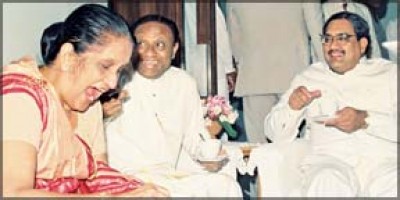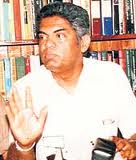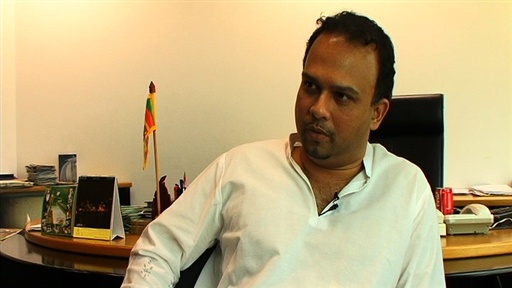Anatomy of an Amendment
“The future is dark, uncertain. But we can see part of the way leading to it and can tread it with firm steps, remembering that nothing that can happen is likely to overcome the spirit of man which has survived so may perils. Remembering also that life, for all its ills, has joy and beauty, and we can always wander, if we know how to, in the enchanted woods of nature”
– Jawaharlal Nehru- The Discovery of India
The Thirteenth Amendment (13 A) to our Constitution had a very ominous birth. It was an
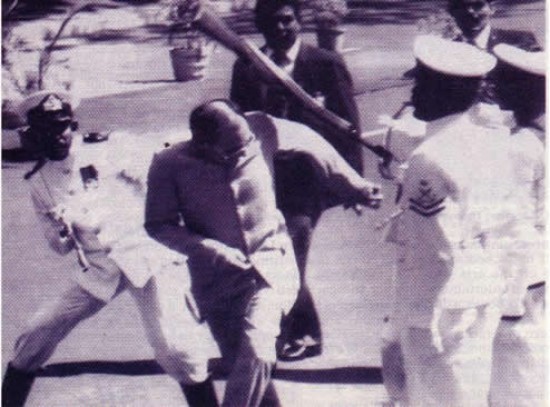
Time magazine, in its cover story (Aug.10, 1987), provided only a skimpy three sentence description of what happened to Rajiv Gandhi on July 30, 1987. To quote Time magazine’s reportage, “As the Prime Minister strode past the white-uniformed men of a Sri Lankan naval honor guard, one of the sailors suddenly broke ranks and swung at Gandhi with the butt of his rifle. The Prime Minister ducked and received only a glancing blow on the back of his neck and left shoulder. But if he escaped serious injury in the incident, for which the Sri Lankan government quickly apologized, the Prime Minister must have realized how much strife and distrust had been aroused by the pact he had just initialed – and how uncertain were its chances of success.” [p.7] This description was supplemented with the frontal view photo of Rajiv Gandhi leaning forward and ducking to deflect the full force of the ‘about-to land’ rifle butt.
At the present moment, for understandable reasons of political prudence, neither the Indians nor the Sinhalese wish to be reminded of why Vijithamuni Rohana de Silva (a Sinhalese naval rating) attacked Rajiv Gandhi. Obviously, Indians were humiliated and that assassination attempt was a rude reality-check for the gung-ho spirit of the self-gloating India’s bureaucrats who were salivating to harvest much political mileage for their diplomatic triumph in Sri Lanka. Colombo’s political bigwigs of the day were embarassed beyond belief because they had been exposed by a slick operator as ‘having no clothes’ like the emperor in the Hans Christian Anderson story. Nevertheless, it is no secret that not an insignificant number of Sinhalese protesters (including some of the Cabinet ministers who publicly opposed the Indo-Sri Lankan Accord) would have silently gloated over Rajiv Gandhi’s mishap.
The then main Opposition, the Sri Lanka Freedom Party (SLFP) led by the mother and son
combination of Sirima and Anura Bandaranaike, ably assisted by the current President and some of his present Cabinet colleagues, led from one overt front.
The Janatha Vimukthi Peramuna (JVP) with its leader, Rohana Wijeweera in hiding and Upatissa Gamanayake ostensibly deputizing for him, unleashed a spate of violence, mayhem and utter destruction of public and private property. At certain points of this organized chaos were fallen telephone poles across the roads, burning buses, vandalized walls of public institutions, broken culverts, gushing water from destroyed pipelines, graffiti-written public buildings and even violence visited upon those who were identified as supporters of the then UNP-led Government. When politicians and Buddhist Monks took to the streets and led the riots, thugs of the petty-kind and merchants of pseudo-patriotism sold their merchandize to a marketplace of utterly gullible masses.
Yet the signing of the Accord was consummated. Except perhaps, R Premadasa, the then Prime
Minister and Lalith Athulathmudali, Minister of Trade, (Ministers Cyril Mathew and Gamini Jayasuriya had already resigned from the Cabinet by this time), the rest of the Government Ministers and Parliamentarians stood behind the Accord and President Jayewardene.
The introduction of the Indian Peace Keeping Forces (IPKF) gave birth to a fresh army of “patriots”. Armed with clubs, handguns, knives and tin-bombs, these soldiers of fortune brandished these weapons in the one hand and the “Mahawansa” in the other. These were the anguished children of the “Mahawansa” mindset. With pent up feelings of anger, envy and distress for centuries under foreign rule, their misplaced sense of patriotism was let loose at the expense of tolerance, patience and fundamental decency.
Sri Lanka once again proved, beyond any shadow of doubt that she had a long way to travel if she wished to attain the status of a fully-developed liberal democracy. Universal Franchise alone  does not suffice for one to be accepted as an equal partner in the brotherhood of nations who are bound by the common thread of democracy and decency. Even the visiting dignitary, none lower than the Indian Head of Government, Prime Minister Rajiv Gandhi was not spared.
does not suffice for one to be accepted as an equal partner in the brotherhood of nations who are bound by the common thread of democracy and decency. Even the visiting dignitary, none lower than the Indian Head of Government, Prime Minister Rajiv Gandhi was not spared.
At the ceremonial departure ceremony, a naval rating let his heavy metal gun fall on the shoulders of the Indian Prime Minister, an insult to injury. Gandhi displayed remarkable poise and calm, for he had come to accomplish a greater mission than react to a mad man’s fury. (Later President Premadasa pardoned this naval rating and freed him from the prison sentence that he was serving!).
While Wijeweera led his murderous onslaught on the South, Prabhakaran, utterly dejected and insulted by the Indian Government (Prabhakaran maintained that he was coerced to agree to the Gandhi/J R Accord), waited patiently for his time to come. Ranjan Wijeratne, the then Minister of National Security and Deputy Minister of Defense crushed the Southern riots with ruthless efficiency while the Northern terrorists continued to hold sway owing mainly to an undersupplied Army and other Security forces and also due to a lack of decisive political leadership at the center.
Nevertheless, the Provincial Council system continued to sustain itself in the eight provinces except the North as the Supreme Court intervened and demerged the North/East merger.
Now the war is over. In fact three years have gone by after the cessation of hostilities between the Sri Lankan security forces and the Liberation Tigers Tamil Elam (LTTE). The LTTE has been decimated. Some of its last remnants are still languishing behind bars while some sympathizers have taken their cause beyond the shores of Sri Lanka, calling themselves the “Tamil Diaspora”. Yet the enmity and anger generated by the cruel ethnic war seems to have taken permanent refuge in the minds of a gullible Sinhalese Buddhist populace, most ably and openly backed by some fringe elements in the present regime and populist-minded Buddhist Monks. The Tamil National Alliance (TNA) on the other hand, had a very comfortable passage into Parliament form the Northern Province. Their show of strength in the Eastern Province was no worse when one considers the latest PC elections in the Eastern Province in which they were the outright winners in the predominantly Tamil districts of Trincomalee and Batticaloa.
When the TNA leaders met up with the Indian Leaders that included Prime Minister, Manmohan Singh, the so-called “patriotic” feelings of the aforementioned fringe elements in the
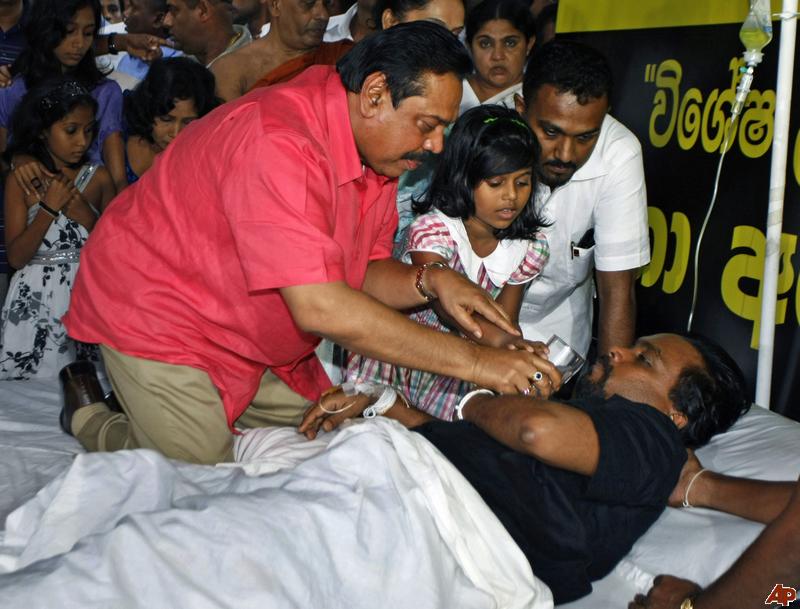
Sri Lanka’s President Mahinda Rajapaksa offers a glass of water to his Housing Minister Wimal Weerawansa to end his hunger strike, outside the U.N. office in Colombo, Sri Lanka, Saturday, July 10, 2010. Weerawansa on Saturday accepted king coconut water offered to him by Rajapaksa to end a three-day fast opposite the U.N. office and was taken away by an ambulance to a hospital after the U.N. Secretary General Ban Ki-moon asked Sri Lanka to normalize conditions around the office of the world body. Photo taken from Sulekha.com
Government found expression in the statements issued by their chief protagonists, Champika Ranawaka of the Jathika Hela Urumaya (JHU) and Wimal Weerawansa of Jathika Nidahas Peramuna (JNP). Openly backed by statements issued every now and then by the Secretary of Defense, who happens to be the younger brother of President Rajapaksa, the JHU and JNP enjoy the confidence of that segment of the population who might interpret the support of Defense Secretary to this group as a vicarious blessing from the President himself.
However, in the meantime, the Minister of Mass Media and Information, Keheliya Rambukwella said government has no intention to abolish the 13th Amendment for the time being. The inclusion of words “for the time being” is a strong expression of the government’s fragility on the acceptance of the status quo, in so far as this Amendment is concerned. Nonetheless, there was one other Minster, although not known to be among the “Rajapaksa-henchmen”, who made an open statement as to his position with regard to the Thirteenth Amendment.
That is Navin Dissanayake, Minister of Public Reforms and the elder son of the late Gamini Dissanayake to whom the authorship of the Thirteenth Amendment itself is attributed. He stated
that the Thirteenth Amendment is a just and fair amendment and it has to stay. He said this at the eighteenth death anniversary held in conjunction with a book release in memory of his slain father on October 25, at the Bandaranaike Memorial International Conference Hall (BMICH). Navin Dissanayake could not have chosen a better audience and a more appropriate occasion for his pronouncement. Gamini Dissanayake’s views and the most daring position that he took in relation to the Gandhi/J R Accord and the Thirteenth Amendment, are well known and they have been meticulously documented. As the last true “liberal”, after S W R D Bandaranaike and Dudley Senanayake, who traversed the political landscape of Sri Lanka, Gamini Dissanayake’s intellectual, legal and political input into the very substance of the Gandhi/J R Accord was at the core of the Accord. Had he become the President of Sri Lanka, (the country was not so fortunate), I am sure, things would have been much saner and more accommodating in the craft of state affairs. Lamenting his loss is not the need of the hour.
More positive and forward-looking policies need to be promulgated, adopted and implemented if we are serious about behaving as a responsible member of the world community. History was changed by the peacemakers. Lessons learnt from history can be very expensive, yet the neglect to learn can be catastrophic. Empires have risen and fallen, political parties have lived and died, yet the spirit of man continues, as Jawaharlal Nehru wrote in his celebrated “The Discovery of India”, to shed light upon this earth. We need such leaders, we need such thoughts of enlightenment and we need such daring of the spirit. It is the true challenge of the times.
